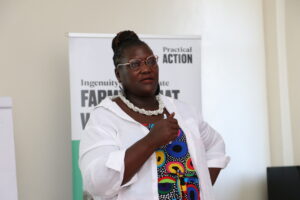PARTNER SPOTLIGHT – Kenya Female Advisory Organization (KEFEADO)
This article is part of the 16 Days Against Gender-Based Violence campaign, 2023
This article is part of the 16 Days Against Gender-Based Violence campaign, 2023
The Kenya Female Advisory Organization (KEFEADO) is the gender and social inclusion partner in the Resilient Agriculture that Works for the Youth (RAY) programme (2023-2027) by Mastercard Foundation in partnership with Practical Action Kenya.
 Please tell us about yourself
Please tell us about yourself
My name is Easter Achieng’ Okech. I am the Executive Director & Programmes Coordinator at the Kenya Female Advisory Organization (KEFEADO). I am a passionate African feminist and human rights defender. I focus on advancing the rights of women and persons with disabilities. I am also a licensed researcher.
Tell us a bit about KEFEADO
KEFEADO is a local women’s rights and gender equality NGO. It was founded in 1994 by the Late Dolphine Okech and her daughter Dr. Jane Okech, both educationists with strong commitment to gender equality. We promote gender equity and equality, equal opportunities, and human rights for all. Our vision is a violence-free society where there is respect for human rights for all, regardless of gender. We are active in Western Kenya. Our offices are in Bondo Town, Siaya County and Kisumu City.
Please describe KEFEADO’s work in tackling Sexual and Gender-Based Violence (SGBV)?
We recognise that SGBV is rooted in gender inequality. In line with this, we convene or participate in forums with government, communities, media, and other partners to raise awareness and advocate for action against SGBV and gender inequality. We have also contributed to policy development against SGBV in Kisumu and Siaya Counties.
Moreover, we support SGBV survivors to access health and legal services, including in the SGBV units KEFEADO has set up in hospitals in Kisumu and Siaya Counties. We also support women-led businesses to empower their financial independence and reduce likelihood of staying in abusive marriages. In addition, we have provided grants for academic research on gender and diversity.
Overall, we have become a respected knowledge hub on gender and development issues, including SGBV, within the Lake Victoria Basin.
How does KEFEADO partner with Practical Action Kenya in tackling SGBV and advancing gender equality?
We are the gender and social inclusion lead in the Resilient Agriculture that Works for the Youth (RAY) programme supported by Mastercard Foundation in partnership with Practical Action Kenya. The five-year initiative aims to create decent job and income opportunities for 100,000 young people through regenerative agriculture and entrepreneurship. At least 70% of the young people are expected to be women while 5% will be people with disabilities. KEFEADO’s role is to help address the cultural norms and practices hindering women from pursuing agribusiness opportunities. The barriers include limited access to land and SGBV. We are doing this work through behaviour change campaigns as well as training and mentoring young farmers and entrepreneurs to be effective gender champions. We are also supporting the review of the gender mainstreaming policies of counties to be responsive to social and economic needs.
What gives you hope regarding efforts to address SGBV?
The country has good laws and policies against SGBV. Even counties such as Kisumu, Homabay, Migori and Siaya have developed their first-ever policies against SGBV. This is encouraging. But the implementation of these laws and policies is essential to ensure all persons violated at all levels have access to justice. The recent creation of specialised SGBV courts will go a long way towards addressing the vice. In addition, Kenya has made substantial progress in ending Female Genital Mutilation (FGM), a form of SGBV, especially in pastoral communities where the act was so rampant. We can replicate this in all forms of SGBV.
What are KEFEADO’s plans in tackling SGBV and advancing gender equality in five years?
We are looking at working on relevant frameworks at national, regional, and international level to prevent SGBV and ensure legal redress to survivors. We also seek to build up our leadership academy to create spaces for young women and girls to shape their collective and individual future. We also aim to participate more in gender technical working groups bringing together local and national partners to advance gender equality and reverse SGBV.
What challenges does KEFEADO face in addressing SGBV?
Existing male-dominated systems or patriarchy enable SGBV to fester while the criminal justice system does not offer timely and adequate redress for survivors. We have adequate laws and policies against the vice, but implementation falls short. Many SGBV perpetrators are getting away with their crimes. Persons with disabilities are particularly at risk of SGBV since physical, communication or mobility challenges may prevent escape or the ability to seek help.
Your parting shot?
SGBV can be addressed at the household and community levels when perpetrators face legal and social sanctions fully. Also, survivor-centred responses to SGBV that avoid shaming or blaming the victims ensure holistic healing, both psychosocially and physically.
For more information about KEFEADO
Email – [email protected]
Tel – +254 732 774593 / +254 115 431016
Website– https://kefeado.org